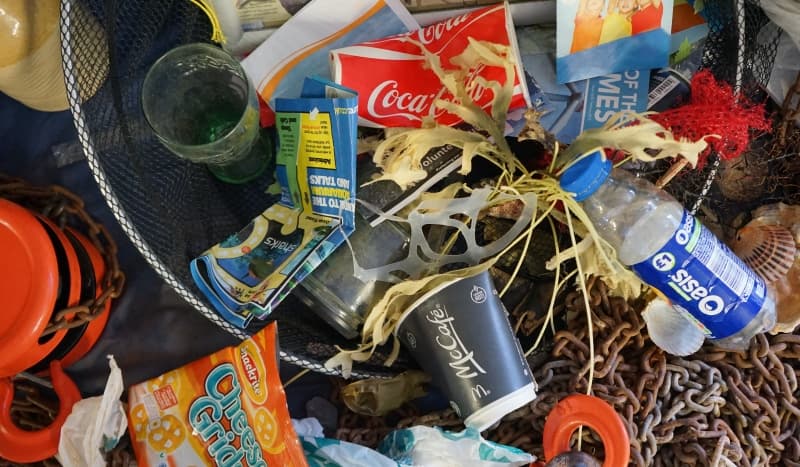What's The Situation With Plastic Pollution?

Plastic has been around for the last 60-70 years. One of the reasons we loved it so much, its longevity, is now the main reason it has become so controversial. It is staggering to consider that nearly every piece of plastic ever created still exists in some form in the world today.
How Much Plastic Exists In The World?
Research conducted by the University of California suggests that 8.3bn tonnes of plastic has been produced. Of this 6.3bn tonnes is now waste which means it sits in landfill or in our environment including the oceans.By plastic we include all items we now use everyday including drinks bottles and food packaging.In fact drinks bottles deserve a special mention as they really do create a whole problem, all on their own.
The Problem Of Plastic Bottles
Drinks bottles are currently the most common type of plastic waste probably reflecting the growing trend of drinking and eating whilst on the go. In fact in one year alone 480bn plastic bottles were sold, that's 1 million bottles sold every minute! But the problem lays in the fact that of these less than 50% are recycled and only 7% are turned into new bottles.That's a lot of plastic put into the world and remaining in the world.
Plastic And The Oceans
It is thought that 10m tonnes of plastic ends up in our oceans each year and it is estimated that this will just continue to rise. China currently tops the list of plastic polluters but the USA isn't that far behind. The issue is that the plastic simply doesn't biodegrade, so it could stay in our oceans for hundreds of years. In fact research suggests that a plastic bottle could take 450 years to biodegrade, an aluminium can 200 years and a nappy 450 years.
The impact on marine life is devastating with many creatures getting entangled in plastic debris. Another problem is that some animals will consume plastic thinking it is food. When ingested plastic causes internal problems and in some cases death. A further concern is the impact plastic could have on human health when we eat fish that have ingested plastic. Plymouth University recently found that plastic was detected in a third of all UK caught fish.
Cotton Buds
Cotton buds deserve a special mention because they are a particular problem. Due to their small size cotton buds pass easily into rivers and seas particularly as many people flush them down the toilet. At sea they are often mistaken for food by many marine animals and they often accumulate toxins from other sources of pollution in the sea. Once eaten by fish they can then re-enter our food chain.
UK Beaches
Plastic waste is seen as a real threat to the UK's beaches. This includes plastic passaging, cotton buds, wet wipes, plastic cutlery and straws and fishing lines. Some of the origin of this waste is unknown but it is estimated that around 11% comes from fishing, 8% from sewage and 30% from the public. The Marine Conservation Society have estimated that there are 718 bits of litter for every 100m part of beach in the UK and that is on the rise.
You Might Like
The Problem With Downloading Music
Streaming or downloading your music? Did you know there are problems and issues over rights with some downloaded music. Why not check our quick guide to find out more.Protecting Our Teeth From Dental Erosion
We all know about tooth decay from excessive sugar but what about tooth erosion from excessive acid? Read our guide to help you keep your teeth healthy and cavity free.Our Favourite Beauty Trends of 2017
Want to know what our favourite beauty trends of 2017 are? Skin, Makeup and Hair all covered in this great guide.The Dangerous Levels Of Salt In Our Takeaways
Research suggests that takeaways are bad for us as they often contain high levels of salt.How can we eat healthier takeaways?How Exercise In Old Age Can Protect Our Immune System
Keeping fit in old age can be just as important to our immune system as for our weight and mental health. Read our guide to see how you can make some simple changes.
Useful Websites
- APES
Will handle your Air Pollution Control project from start to finish - Micronair
Specialists in dust filtration, pollution control, mineral and glass fibre manufacture - Greenbank Technology Ltd
Supply customised industrial dryers and air systems, includes hot air systems for paper making, converting and web process industries, food process dryers, energy recovery and pollution control - Sound Specialty Coatings
Manufacturers of epoxy, paint, coatings and other products that are environmentally safe and compliant with the clean air, clean water and water pollution control acts - Atmospheric Solutions
Develop affordable scientific solutions to the problem of indoor air pollution with leading UK respiratory consultants and senior members of the British Allergy Foundation - International Association on Water Quality
Professional membership association dedicated to the advancement of the science and practice of water pollution control and water quality management world-wide - Add Your Website Here